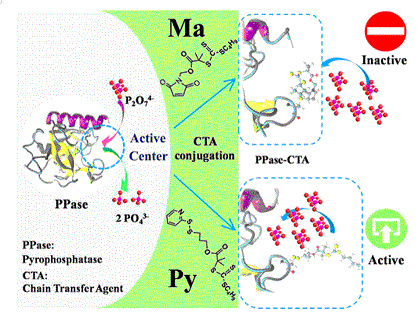, , , , , , and
College of Chemistry, Chemical Engineering and Materials Science, Soochow University, Suzhou 215123, PR China
ACS Appl. Mater. Interfaces, 2016, 8 (25), pp 15967–15974
Protein has been widely applied in biotechnology and biomedicine thanks to its unique properties of high catalytic activity, outstanding receptor–ligand specificity, and controllable sequence mutability. Owing to the easily induced structural variation and thus the inactivation of protein, there has been much effort to improve the structural stability and biological activity of proteins by the use of polymers to modify protein to construct protein–polymer conjugates. However, during the conjugation of polymer to protein active center, the great loss in the original biological activity of the protein is still a serious and so far unsolved question. Here, for the purpose of preparing site-directed and highly structurally stable protein–polymer conjugate, which would possess at least a substantially similar level of biological activity as the original unmodified protein, we proposed a new strategy by using a pyridine chain-transfer agent (CTA-Py) with a soft pyridine-terminated chain for visible-light-induced reversible addition–fragmentation chain transfer (RAFT) polymerization specifically on a number of sites close to the protein active center. The results showed that all the intermediate conjugates PPa–CTA-Py at different modification sites could retain full enzymatic activities (about 110–130% of the unmodified PPa). It was demonstrated by dynamic computer simulation that introducing of CTA-Py had little interference to the protein spatial structure as compared to the popular maleimide chain-transfer agent (CTA-Ma) with rigid maleimide-terminated. Moreover, intermediate conjugates PPa–CTA-Py is facile and ready for further light polymerization under mild conditions. Final PPa–PNIPAAm conjugate produced from CTA-Py exhibited excellent temperature responsiveness and maintained its enzymatic activity even at high temperature. These highly stable and responsive protein–polymer conjugates have great potential and could be widely used in various industrial, chemical, biological, and pharmaceutical applications.

链接:http://pubs.acs.org/doi/abs/10.1021/acsami.6b05408